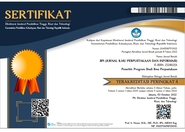Peran Home Library dalam Meningkatkan Literasi Anak (Studi Home Library Dosen di Universitas Muhammadiyah Mataram)
Abstract
The existence of a home library in every family provides easier and guaranteed access to information from information that isn't needed, can grow and develop children's reading interest and culture from an early age, and develop positive brushes and develop children's skills through quality reading. In the context of the Covid 19 pandemic, home libraries are a good alternative in improving children's literacy. This study aims to determine the role of the home library in improving children's literacy (study at Muhammadiyah University of Mataram). The research method uses a qualitative approach. Sources of data obtained through primary sources (direct informants) and secondary sources (books or journals) related to the research. The data collection procedure was carried out by observation, interviews, and documentation. The collected data were analyzed and interpreted. The results showed that the home library plays a role in growing and improving children's literacy such as reading, writing and arithmetic literacy. children's character literacy such as discipline, honesty, responsibility, manners, mutual love, and respect for each other .The role of the home library, among others; first, the home library as a source of children's reading. Second, as a child's learning media. Third, as a place for children's recreation. Fourth, as a medium for children's cultural education. And fifth, as a medium for children's character education.
Keywords
Full Text:
PDFReferences
BUKU
Anis, M dan Sri Rokhyanti Z (Ed.). 2006. Courspack on School/Teacher Librarianship (Kumpulan Artikel tentang Perpustakaan Sekolah/Guru Pustakawan). Yogyakarta: Jurusan Ilmu Perpustakaan dan Informasi Fakultas Adab UIN Sunan Kalijaga Yogyakarta.
Basuki, Sulistyo. 1991 Pengantar Ilmu Perpustakaan. Jakarta: PT Gramedia Pustaka Utama.
Burhan Bungin. 2007. Penelitian Kualitatif. Jakarta: Surya Kencana.
David K. dan Robert A. Manners. 2002. Teori Budaya. Terjemahan, Landung Simatupang. Yogyakarta: Pustaka Pelajar.
Lasa Hs. 2007. Kamus Kepustakawanan Indonesia. Yogyakarta: Pustaka Book Publisher.
Lexy J. Moleong. 2007. Metodologi penelitian Kualitatif. Bandung : PT Remaja Rosdakarya.
Suharsimi Arikunto, Prosedur Penelitian Pendekatan Praktis (Jakarta: Rineka Cipta, 2002).
Sumadi Suryabrata. 2003. Metodologi Penelitian. Jakarta:Raja Grafindo Persada.
Sutarno NS. 2005. Tanggung Jawab Perpustakaan dalam Mengembangkan Masyarakat Informasi. Jakarta: Pantai Rei.
Sugiyono. 2010. Memahami Penelitian Kualitatif. Bandung: CV Alfabeta
Tri Septiyantono. 2015. Literasi Informasi. Tangerang Selatan: Universitas Terbuka.
Putu Laxman Pendit, dkk. 2007. Perpustakaan Digital Perspektif Perpustakaan Perguruan Tinggi Indonesia. Jakarta: Sagung Seto.
ARTIKEL JURNAL
Achmad. 2012. Literacy Informasi: Ketrampilan Penting di Era Global. http://komunitas.wikispaces.com. Di unduh pada 13/01/2012.
Ani Muslimah dan Roro Isyawati. 2018. Gerakan One Home One Library dalam Pemberdayaan kampung Literasi (Studi Kasus di Taman Bacaan Masyarakat Kuncup Mekar Desa Kepek Kecamatan Saptosari Kabupaten Gunung Kidul dalam Jurnal Ilmu Perpustakaan. 7 (2).
Marwiyah. 2006. Understanding Information Literacy as A New Concept in the Librarianship. Fihris: Jurnal Ilmu Perpustakaan dan informasi. 1 (2).
Milana Abdillah Subarkah. 2019. Pengaruh Gadget terhadap Perkembangan Anak. Jurnal Rausyan Fikr. 15 (1).
Rizky Nafaida, dkk.2020. Dampak Penggunaan Gadget terhadap Perkembangan Anak. Best Journal (Biology Education Science dan Technology), 3 (2).
Rohana. 2022. Tradisi memace (Nyaer) Sebagai Media Literasi Budaya di Desa Pagutan, Kec. Batukliang, Lombok Tengah. JPIn: Jurnal Pendidik Indonesia. 5 (1).
DOI: http://dx.doi.org/10.30829/jipi.v7i2.12009
Refbacks
- There are currently no refbacks.
Copyright (c) 2022 Rohana Rohana

This work is licensed under a Creative Commons Attribution-ShareAlike 4.0 International License.










_1.png)
.png)
_.png)

